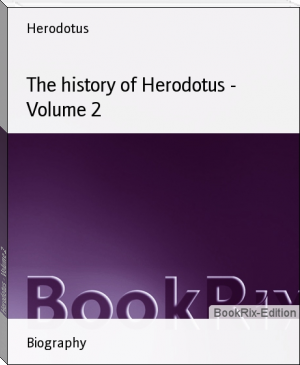The history of Herodotus - Volume 2 - Herodotus (manga ereader txt) 📗

- Author: Herodotus
Book online «The history of Herodotus - Volume 2 - Herodotus (manga ereader txt) 📗». Author Herodotus
and Hymaies and Otanes, who were also Persian commanders and were married also to daughters of Dareios, after they had pursued those Ionians who had made the expedition to Sardis and defeating them in battle had driven them by force to their ships,-after this distributed the cities amongst themselves and proceeded to sack them. 117. Daurises directed his march to the cities on the Hellespont, and he took Dardanos and Abydos and Percote and Lampsacos and Paisos, of these he took on each day one; and as he was marching from Paisos against the city of Parion, the report came that the Carians had made common cause with the Ionians and were in revolt from the Persians. He turned back therefore from the Hellespont and marched his army upon Caria. 118. And, as it chanced, a report of this was brought to the Carians before Daurises arrived; and the Carians being informed of it gathered together at the place which is called the "White Pillars" and at the river Marsyas, which flows from the region of Idrias and runs out into the Maiander. When the Carians had been gathered together there, among many other counsels which were given, the best, as it seems to me, was that of Pixodaros the son of Mausolos, a man of Kindye, who was married to the daughter of the king of the Kilikians, Syennesis. The opinion of this man was to the effect that the Carians should cross over the Maiander and engage battle with the Persians having the river at their backs, in order that the Carians, not being able to fly backwards and being compelled to remain where they were, might prove themselves even better men in fight than they naturally would. This opinion did not prevail; but they resolved that the Persians rather than themselves should have the Maiander at their backs, evidently[92] in order that if there should be a flight of the Persians and they should be worsted in the battle, they might never return home, but might fall into the river. 119. After this, when the Persians had come and had crossed the Maiander, the Carians engaged with the Persians on the river Marsyas and fought a battle which was obstinately contested and lasted long; but at length they were worsted by superior numbers: and of the Persians there fell as many as two thousand, but of the Carians ten thousand. Then those of them who escaped were shut up in Labraunda[93] within the sanctuary of Zeus Stratios, which is a large sacred grove of plane-trees; now the Carians are the only men we know who offer sacrifices to Zeus Stratios. These men then, being shut up there, were taking counsel together about their safety, whether they would fare better if they delivered themselves over to the Persians or if they left Asia altogether. 120. And while they were thus taking counsel, there came to their aid the Milesians and their allies. Then the Carians dismissed the plans which they were before considering and prepared to renew the war again from the beginning: and when the Persians came to attack them, they engaged with them and fought a battle, and they were worsted yet more completely than before; and while many were slain of all parties,[94] the Milesians suffered most. 121. Then afterwards the Carians repaired this loss and retrieved their defeat; for being informed that the Persians had set forth to march upon their cities, they laid an ambush on the road which is by Pedasos,[95] and the Persians falling into it by night were destroyed both they and their commanders, namely Daurises and Amorges and Sisimakes; and with them died also Myrsos the son of Gyges. Of this ambush the leader was Heracleides the son of Ibanollis, a man of Mylasa.
122. These then of the Persians were thus destroyed; and meanwhile Hymaies, who was another of those who pursued after the Ionians that had made the expedition to Sardis, directed his march to the Propontis and took Kios in Mysia; and having conquered this city, when he was informed that Daurises had left the Hellespont and was marching towards Caria, he left the Propontis and led his army to the Hellespont: and he conquered all the Aiolians who occupy the district of Ilion, and also the Gergithes, who were left behind as a remnant of the ancient Teucrians. While conquering these tribes Hymaies himself ended his life by sickness in the land of Troas. 123. He thus brought his life to an end; and Artaphrenes the governor of the province of Sardis was appointed with Otanes the third of the commanders to make the expedition against Ionia and that part of Aiolia which bordered upon it. Of Ionia these took the city of Clazomenai, and of the Aiolians Kyme.
124. While the cities were thus being taken, Aristagoras the Milesian, being, as he proved in this instance, not of very distinguished courage, since after having disturbed Ionia and made preparation of great matters[96] he counselled running away when he saw these things, (moreover it had become clear to him that it was impossible to overcome king Dareios),-he, I say, having regard to these things, called together those of his own party and took counsel with them, saying that it was better that there should be a refuge prepared for them, in case that they should after all be driven out from Miletos, and proposing the question whether he should lead them from thence to Sardinia, to form a colony there, or to Myrkinos in the land of the Edonians, which Histiaios had been fortifying, having received it as a gift from Dareios. This was the question proposed by Aristagoras. 125. Now the opinion of Hecataios the son of Hegesander the historian[97] was that he should not take a colony to either of these places, but build a wall of defence for himself in the island of Leros and keep still, if he should be forced to leave Miletos; and afterwards with this for his starting point he would be able to return to Miletos. 126. This was the counsel of Hecataios; but Aristagoras was most inclined to go forth to Myrkinos. He therefore entrusted the government of Miletos to Pythagoras, a man of repute among the citizens, and he himself sailed away to Thrace, taking with him every one who desired to go; and he took possession of the region for which he had set out. But starting from this to make war, he perished by the hands of the Thracians, that is both Aristagoras himself and his army, when he was encamped about a certain city and the Thracians desired to go out from it under a truce. -----
NOTES TO BOOK V
1. {ie paion} (or {paian}), as the burden of a song of triumph.
2. {eggenetai}: many MSS. and some Editors read {en genetai}, "and
the race can never become united."
3. iv. 93.
3a. Or "from the time that he was born."
4. {to astikton} is probably for {to me estikhthai}: but possibly the
meaning may be, "those who are not so marked are of low birth."
5. "the greatest prizes are assigned for single combat in proportion"
(as it is more difficult).
6. Or "Siriopaionians."
7. The words "and about the Doberians and Agrianians and Odomantians"
are marked by Stein as an interpolation, on the ground that the
two tribes first mentioned are themselves Paionian; but Doberians
are distinguished from Paionians in vii. 113.
8. {theres katarraktes}: the MSS. have {thures katapaktes} (which can
hardly be right, since the Ionic form would be {katapektes}),
meaning "fastened down." Stein suggests {thures katepaktes} (from
{katepago}), which might mean "a door closed downwards," but the
word is not found. (The Medicean MS. has {e} written over the last
{a} of {katapaktes}.)
9. {diapinontes}: or perhaps, "drinking against one another."
10. See viii. 137.
11. i.e. "he was drawn to run in the first pair."
12. The best MSS. give this form throughout, which is also used by
Æschylus: cp. iii. 70, note 60.
13. {ekakothesan}.
14. {toutou}: it is doubtful whether this means his power or his
death. Perhaps something has dropped out after {teleuta}.
15. {anesis}: a conjectural emendation of {aneos}. (Perhaps however,
the word was rather {ananeosis}, "after a short time there was a
renewal of evils"). Grote wishes to translate this clause, "after
a short time there was an abatement of evils," being of opinion
that the {anesis kakon} lasted about eight years. However the
expression {ou pollon khronon} is so loose that it might well
cover the required period of time.
16. {praskhema}.
17. i.e. Miletos and Naxos.
18. {ton pakheon}.
18a. {umin}: omitted in some MSS. and editions.
19. Lit. "dividing him in such a manner."
20. {kai to teikhos esaxanto}: {esaxanto} from {satto}, which
generally means "load." Various conjectures have been made, e.g.
{kai to teikhos ephraxanto}, or {kata takhos esaxanto}, the comma
after {pota} being removed.
20a. {me de neoteron ti poieuses tes Miletou}, "if Miletos made no
change (i.e. rebellion)."
21. {katairetheie}, "taken down" from their place (cp. {anetheke}
below).
22. {en to peoto ton logon}. The reference is to i. 92.
23. {isonomien}: cp. iii. 80.
24. {akromantes}: cp. {akrakholos}. It may mean "somewhat mad," so
{akrozumos}, "slightly leavened," and other words.
25. {Kinupa}: for this Stein reads by conjecture {Aibuen} and
afterwards {para Kinupa potamon} for {para potamon}: but Kinyps
was the name of the district about the river (iv. 198), and the
name of the river is easily supplied from this.
26. {Makeon te kai Libuon}. The Macai were of course Libyans,
therefore perhaps we should read (with Niebuhr) {Makeon te
Libuon}: or {Makeon te kai allon Libuon}.
27. Stein thinks that Heracleia Minoa on the S. coast of Sicily cannot
be meant, because too distant to be considered part of the "land
of Eryx." Evidently however this expression is very vague, and
there seems no need to correct the text as he proposes.
28. {para ten Italion}: the name applied anciently only to the South-
West of the peninsula.
29. {Krathin}, the MSS. give {krastin} here, and {krastie} below for
{Krathie}. Sybaris was situated between the rivers Crathis and
Sybaris.
30. i.e. "of the Market-place."
31. {periodos}.
32. {kurbasias}: see vii. 64.
33. {poluargurotatoi}: this seems to include gold also, for which
Lydia was famous.
34. {poluprobatotatoi}.
35. {tende}, pointing to it in the map.
36. If {anaballesthai} is the true reading here, it cannot mean, "put
off to another time," as Stein translates it; for the form of the
sentence proves that it is to be taken as a question, co-ordinate
with that which follows: {peri men khores ara
122. These then of the Persians were thus destroyed; and meanwhile Hymaies, who was another of those who pursued after the Ionians that had made the expedition to Sardis, directed his march to the Propontis and took Kios in Mysia; and having conquered this city, when he was informed that Daurises had left the Hellespont and was marching towards Caria, he left the Propontis and led his army to the Hellespont: and he conquered all the Aiolians who occupy the district of Ilion, and also the Gergithes, who were left behind as a remnant of the ancient Teucrians. While conquering these tribes Hymaies himself ended his life by sickness in the land of Troas. 123. He thus brought his life to an end; and Artaphrenes the governor of the province of Sardis was appointed with Otanes the third of the commanders to make the expedition against Ionia and that part of Aiolia which bordered upon it. Of Ionia these took the city of Clazomenai, and of the Aiolians Kyme.
124. While the cities were thus being taken, Aristagoras the Milesian, being, as he proved in this instance, not of very distinguished courage, since after having disturbed Ionia and made preparation of great matters[96] he counselled running away when he saw these things, (moreover it had become clear to him that it was impossible to overcome king Dareios),-he, I say, having regard to these things, called together those of his own party and took counsel with them, saying that it was better that there should be a refuge prepared for them, in case that they should after all be driven out from Miletos, and proposing the question whether he should lead them from thence to Sardinia, to form a colony there, or to Myrkinos in the land of the Edonians, which Histiaios had been fortifying, having received it as a gift from Dareios. This was the question proposed by Aristagoras. 125. Now the opinion of Hecataios the son of Hegesander the historian[97] was that he should not take a colony to either of these places, but build a wall of defence for himself in the island of Leros and keep still, if he should be forced to leave Miletos; and afterwards with this for his starting point he would be able to return to Miletos. 126. This was the counsel of Hecataios; but Aristagoras was most inclined to go forth to Myrkinos. He therefore entrusted the government of Miletos to Pythagoras, a man of repute among the citizens, and he himself sailed away to Thrace, taking with him every one who desired to go; and he took possession of the region for which he had set out. But starting from this to make war, he perished by the hands of the Thracians, that is both Aristagoras himself and his army, when he was encamped about a certain city and the Thracians desired to go out from it under a truce. -----
NOTES TO BOOK V
1. {ie paion} (or {paian}), as the burden of a song of triumph.
2. {eggenetai}: many MSS. and some Editors read {en genetai}, "and
the race can never become united."
3. iv. 93.
3a. Or "from the time that he was born."
4. {to astikton} is probably for {to me estikhthai}: but possibly the
meaning may be, "those who are not so marked are of low birth."
5. "the greatest prizes are assigned for single combat in proportion"
(as it is more difficult).
6. Or "Siriopaionians."
7. The words "and about the Doberians and Agrianians and Odomantians"
are marked by Stein as an interpolation, on the ground that the
two tribes first mentioned are themselves Paionian; but Doberians
are distinguished from Paionians in vii. 113.
8. {theres katarraktes}: the MSS. have {thures katapaktes} (which can
hardly be right, since the Ionic form would be {katapektes}),
meaning "fastened down." Stein suggests {thures katepaktes} (from
{katepago}), which might mean "a door closed downwards," but the
word is not found. (The Medicean MS. has {e} written over the last
{a} of {katapaktes}.)
9. {diapinontes}: or perhaps, "drinking against one another."
10. See viii. 137.
11. i.e. "he was drawn to run in the first pair."
12. The best MSS. give this form throughout, which is also used by
Æschylus: cp. iii. 70, note 60.
13. {ekakothesan}.
14. {toutou}: it is doubtful whether this means his power or his
death. Perhaps something has dropped out after {teleuta}.
15. {anesis}: a conjectural emendation of {aneos}. (Perhaps however,
the word was rather {ananeosis}, "after a short time there was a
renewal of evils"). Grote wishes to translate this clause, "after
a short time there was an abatement of evils," being of opinion
that the {anesis kakon} lasted about eight years. However the
expression {ou pollon khronon} is so loose that it might well
cover the required period of time.
16. {praskhema}.
17. i.e. Miletos and Naxos.
18. {ton pakheon}.
18a. {umin}: omitted in some MSS. and editions.
19. Lit. "dividing him in such a manner."
20. {kai to teikhos esaxanto}: {esaxanto} from {satto}, which
generally means "load." Various conjectures have been made, e.g.
{kai to teikhos ephraxanto}, or {kata takhos esaxanto}, the comma
after {pota} being removed.
20a. {me de neoteron ti poieuses tes Miletou}, "if Miletos made no
change (i.e. rebellion)."
21. {katairetheie}, "taken down" from their place (cp. {anetheke}
below).
22. {en to peoto ton logon}. The reference is to i. 92.
23. {isonomien}: cp. iii. 80.
24. {akromantes}: cp. {akrakholos}. It may mean "somewhat mad," so
{akrozumos}, "slightly leavened," and other words.
25. {Kinupa}: for this Stein reads by conjecture {Aibuen} and
afterwards {para Kinupa potamon} for {para potamon}: but Kinyps
was the name of the district about the river (iv. 198), and the
name of the river is easily supplied from this.
26. {Makeon te kai Libuon}. The Macai were of course Libyans,
therefore perhaps we should read (with Niebuhr) {Makeon te
Libuon}: or {Makeon te kai allon Libuon}.
27. Stein thinks that Heracleia Minoa on the S. coast of Sicily cannot
be meant, because too distant to be considered part of the "land
of Eryx." Evidently however this expression is very vague, and
there seems no need to correct the text as he proposes.
28. {para ten Italion}: the name applied anciently only to the South-
West of the peninsula.
29. {Krathin}, the MSS. give {krastin} here, and {krastie} below for
{Krathie}. Sybaris was situated between the rivers Crathis and
Sybaris.
30. i.e. "of the Market-place."
31. {periodos}.
32. {kurbasias}: see vii. 64.
33. {poluargurotatoi}: this seems to include gold also, for which
Lydia was famous.
34. {poluprobatotatoi}.
35. {tende}, pointing to it in the map.
36. If {anaballesthai} is the true reading here, it cannot mean, "put
off to another time," as Stein translates it; for the form of the
sentence proves that it is to be taken as a question, co-ordinate
with that which follows: {peri men khores ara
Free e-book «The history of Herodotus - Volume 2 - Herodotus (manga ereader txt) 📗» - read online now
Similar e-books:





Comments (0)